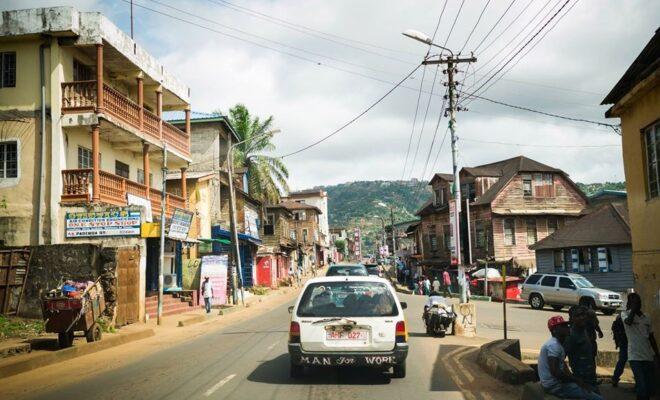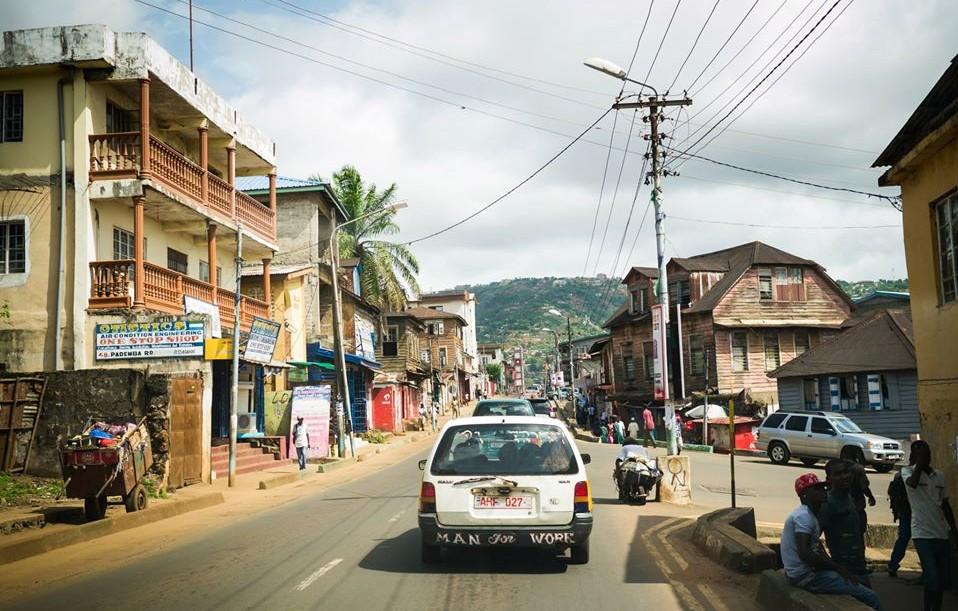Freetown just implemented a new tax system that could quintuple revenue

Here’s how it works.

On the streets of Freetown, Sierra Leone. Credit: Rhiannon McCluskey.
In the next few weeks, residents of Freetown are expecting to receive new property tax bills as part of a revamped and more progressive system. Approved as Sierra Leone was entering lockdown in mid-April, the revised arrangement places a greater onus on the richest and could increase the capital’s tax revenue five-fold.
The new system has been in the works since Yvonne Aki-Sawyerr was elected mayor in 2018 and made improved revenue collection a central component of her Transform Freetown agenda. Like many cities, Sierra Leone’s capital has long been hampered by limited tax revenues. Aki-Sawyerr recognised that in order to expand services, the Freetown City Council (FCC) would need to dramatically increase property tax collection.
She convened a working group, which decided to implement a simplified “points based” system. This involved the city’s authorities using satellite imagery to identify and measure every property in Freetown. They then deployed teams to collect data on easily observable characteristics such as the quality of walls, roofs and windows. And then they used existing data on rental values to build a simple model for calculating the taxable value of each property. The city council also developed a new IT system to manage this entire process: from data collection to valuation, billing, payments, appeals and enforcement.
Through this process, the city received technical support from the International Centre for Tax and Development (ICTD) and International Growth Centre (IGC), and aid from the UK government.
Trust and transparency
While it may seem straightforward on the surface, the reformed “points-based” system introduced in Freetown provides crucial advantages over alternative approaches. It is far easier to administer than systems that rely on individual experts to value each property. It is more sustainable than more complex modelling approaches, which require detailed data that is often not available and are dependent on external support. And it is more equitable than systems based on buildings’ surface area, which tend to dramatically under-tax more valuable properties.
Moreover, Freetown’s system is likely to be more acceptable to taxpayers – and more resistant to corruption – because every aspect of the valuation is transparent, readily available, and verifiable. A key objective is to ensure every property is subject to a standardised process that is easily understood and roughly mirrors market values. The goal is to ensure universality and fairness to help build trust with taxpayers.
The new system should also dramatically grow revenues by expanding coverage and increasing taxes on high-value properties. The city council has now registered virtually every property in Freetown, roughly doubling the number on the tax register from 57,000 to about 110,000. Most critically, the new system has resulted in much higher tax bills for the most valuable properties. Expensive properties have long been severely under-taxed, and the new system better reflects the enormous disparities in property values, wealth, and ability to pay across the city.
As can be seen in the table below, the tax payable on the top 20% of properties has more than tripled, on average. At the same time, that on the bottom 20% has been more than halved. Under this system, Freetown’s potential revenue from property tax has increased more than five-fold, 70% of which will come from the top quarter.
Table 1: Change in tax liabilities by property value quintiles (currency in USD)
| Average tax payable | Existing system | New system | Average change |
| 1st Quintile | $14.33 | $4.31 | -70% |
| 2nd Quintile | $15.85 | $9.48 | -40% |
| 3rd Quintile | $16.10 | $17.40 | +8% |
| 4th Quintile | $23.38 | $36.94 | +58% |
| 5th Quintile | $41.64 | $142.25 | +242% |
Bold leadership in the face of crisis
The implementation of Freetown’s new tax system was almost upended by the coronavirus pandemic. As the disease spread and countries including Sierra Leone imposed lockdowns, many governments also started granting people and businesses tax reliefs and deferrals.
The Mayor of Freetown was presented with a dilemma. Proceed with the reform to raise desperately needed revenues? Or abandon it in favour of tax relief?
The former was politically fraught. The new system would lead to significant tax increases for the city’s elites, now amid a global economic and health crisis. But Aki-Sawyerr also knew that while some governments could borrow heavily, Freetown’s city council did not have that option. In order to finance their response to COVID-19, the city would need to raise revenues through taxes.
She decided to push ahead, but with a twist. The reforms would focus initially on to the most valuable 50% of properties, before being rolled out more broadly. The council would start by collecting from those with the greatest ability to pay. Meanwhile, in order to reduce COVID-19 related health risks, it would introduce contactless delivery of tax bills, operate help desks by phone, email and WhatsApp, and allow for payments via decentralised bank branches across the city.
The plan received full approval on 16 April and property tax bills will begin being distributed on 1 June.
Freetown is just getting started, but its experience suggests that sustaining tax revenues can be an integral part of responding to COVID-19 – and making cities work better in the long-term. It shows that, even in difficult times, raising revenues in a progressive manner is possible.
Many other governments could make similar progress relatively quickly, building on the innovative methods and tools deployed in Freetown and focusing first on high-value areas. This could go a long way to funding urgently needed services. Doing so, however, will require the kind of political courage exhibited by Mayor Aki-Sawyerr and the Freetown City Council.







This system is a more improved version of point based systems implemented first implemented in Makeni city in 2006 and subsequently other local councils. Thanks to the initial Writer Paul Fish and IT Specialist Jethro Burtner. Thanks also to the team of property tax practitioners especially Wilson Prichard for his technical and coordinating support to leading this very important reform for FCC. Above all to the Mayor of FCC for her relentless effort to champion this all important property tax reform.
A couple of issues that may worth consideration in the medium term of the reform
Property rates will quintuple. Perfect. However we should be mindful of the unrealistic rates taxpayers have been used to. It will be a backlash on the council for someone who was initially paying LeX (with improper assessment) that will now be paying Le 4X. Was thinking the council comes out with a plan for such taxpayers to be paying graduated rates over time. That is in year 1.. you pay Le1.5X; Year 2, Le2x; year Le3X………and so on with the assumption that improve services will be provided over the time period to specific communities with high valued properties. Considering such situation, it is always difficult to out rightly convince the bulk of taxpayers on how transparent and less subjective adjustment factors, mill rates and subsequently property rates are calculated
Also over time, there may be need to review the adjustment factors in favour of services that are exclusive competencies of the council (solid and liquid waste management, water, etc) rather than ‘so called’ wealth indicators, given the recent discourse of perceiving property tax as tax to improve on basic services instead of perceive it as a tax on the individual wealth of taxpayers. A fine balance would be to agree on adjustment factors on a (50/50) basis in favour of wealth and service delivery indicators.
Tenants (mostly the poor living in abject poverty) would carry the burden . Besides, Madam Mayoe has doubled property annually since 2018 -check recorda .
To me, this is a formal ploy to tell residents of Freetown to pack and go back to the rural areas of Sierra Leone .
My bone of contention is transparency and accountability of funds accrued .
chloroquine phosphate side effects https://chloroquineorigin.com/# hydroxychlor